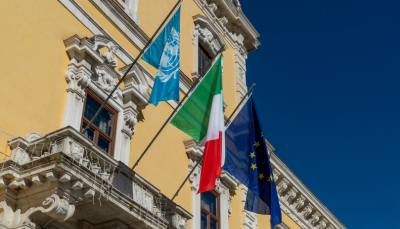Two young Palestinian students from Gaza arrived in Italy on Thursday 23 October to begin their university studies at the University of Brescia, thanks to four-year scholarships funded by the University as part of the IUPALS – Italian Universities for Palestinian Students project. The initiative, promoted by the Conference of Italian University Rectors (CRUI) and supported by the Ministry of Foreign Affairs and International Cooperation (MAECI), has so far involved 35 Italian universities with the aim of facilitating the tertiary education of Palestinian students and promoting processes of internationalisation and cultural integration.
The students, who are staying in university residences, were welcomed in the Apollo Hall of the Rectorate by Vice-Rector Prof. Adriana Apostoli and Vice-Rector for Internationalisation Policies Prof. Roberto Ranzi.
Students will have access to a structured training programme: an initial induction semester, during which they will improve their knowledge of the Italian language and basic skills in the legal, economic and engineering fields, followed by attendance at the first year of their chosen degree course. In addition to financial support, the University, through its Student Centre, will launch initiatives dedicated to the integration and promotion of the psychological and physical well-being of scholarship recipients. Thanks to collaboration with local organisations and institutions – the Municipality of Brescia, Cooperativa Kemay and Centro Migranti ETS – additional services will also be offered, such as free urban transport passes and coverage of residence permit expenses. The NONSOLONOI ODV association in Rezzato will also provide linen, clothing, food and a sum of money as pocket money.
The collaboration between Italian and international institutions was fundamental to the success of the project. The academic corridor was made possible thanks to the Ministry of University and Research and the Ministry of Foreign Affairs and International Cooperation. The following organisations were actively involved in ensuring the academic corridor: the Guardia di Finanza (Italian Financial Police), the Civil Protection Agency and the European Civil Protection Mechanism, the Consulate General of Italy in Jerusalem, the Italian Embassy in Jordan, the Crisis Unit of the Ministry of Foreign Affairs, the Schools of the Holy Land and the John Paul II Foundation.


